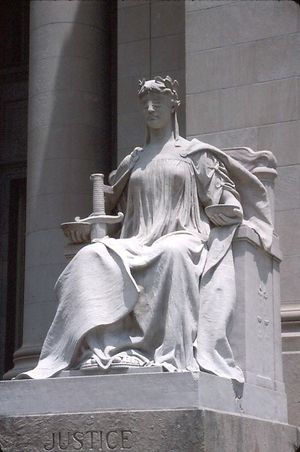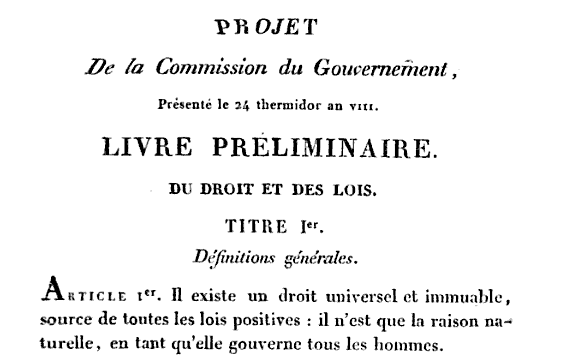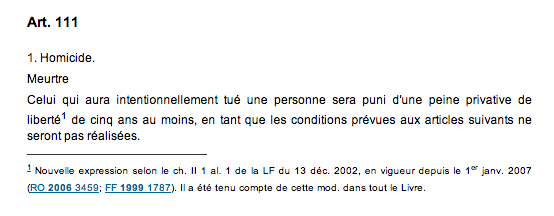« Introduction to the Law : Key Concepts and Definitions » : différence entre les versions
| Ligne 65 : | Ligne 65 : | ||
*'''Positive law''': it consists of all the legal rules in force in a State or in the international community at a given time. It is the "settled" right, the right as it really exists. (objective law and subjective right) | *'''Positive law''': it consists of all the legal rules in force in a State or in the international community at a given time. It is the "settled" right, the right as it really exists. (objective law and subjective right) | ||
*'''Natural law''': Natural law is law based on an order of eminent values (ideal justice, moral duty); it constitutes a set of principles of justice, resulting from nature and/or reason, which is considered as the inspiration or complement to positive law. These are rules that are superior to the rules of positive law; they are based on and serve as a reference. They are rules that inspire positive law, because they announce higher principles of justice, a set of unwritten values and principles. | *'''Natural law''': Natural law is law based on an order of eminent values (ideal justice, moral duty); it constitutes a set of principles of justice, resulting from nature and/or reason, which is considered as the inspiration or complement to positive law. These are rules that are superior to the rules of positive law; they are based on and serve as a reference. They are rules that inspire positive law, because they announce higher principles of justice, a set of unwritten values and principles. | ||
The French Civil Code of 1804 was conceived according to the idea that after the revolution it was good to establish a civil law applicable to all and all regions of France. It governs relations between individuals and applies to all French people regardless of the region in which they live. | |||
Article 1 proclaimed "There is a universal and immutable law that is the source of all positive laws, it is only natural reason inasmuch as it governs men". | |||
[[Fichier:Code civil 1804 article 1.png|700px|vignette|centré|Code Civil de 1804 - Article 1er]] | [[Fichier:Code civil 1804 article 1.png|700px|vignette|centré|Code Civil de 1804 - Article 1er]] | ||
Version du 21 juin 2019 à 13:20
| Professeur(s) | Victor Monnier[1][2][3][4][5][6] |
|---|---|
| Cours | Introduction au droit |
Lectures
- Définition du droit
- L’État
- Les différentes branches du droit
- Les sources du droit
- Les grandes traditions formatrices du droit
- Les éléments de la relation juridique
- L’application du droit
- La mise en œuvre d’une loi
- L’évolution de la Suisse des origines au XXème siècle
- Le cadre juridique interne de la Suisse
- La structure d’État, le régime politique et la neutralité de la Suisse
- L’évolution des relations internationales de la fin du XIXe au milieu du XXe siècle
- Les organisations universelles
- Les organisations européennes et leurs relations avec la Suisse
- Les catégories et les générations de droits fondamentaux
- Les origines des droits fondamentaux
- Les déclarations des droits de la fin du XVIIIe siècle
- Vers l’édification d’une conception universelle des droits fondamentaux au XXe siècle
The law is the set of socially enacted and sanctioned rules of conduct that apply to members of society. The law is the set of rules that govern the relationship between men. Its function is to ensure the peaceful coexistence of the members of society within it. It is used to pacify relationships between individuals. Its purpose is also to organize society in order to protect the interests and property essential to living together. Law is the foundation of social order.
What is law?
The law in society
Society is the gathering of men living in groups under common rules. The human being is constantly in contact with his fellow human beings, he will provoke an infinite number of relationships with others.
- The organization of society, public constraint and the legal order
In any society, human beings are subject to constraints.
- "public" coercion:
- Public coercion refers to the power of coercion that belongs to the State authorities and, by extension, that is granted to the holder of a right in order to enforce it.
- "legal" order: The legal order consists of the rules imposed and sanctioned by law; it is the set of rules of law that govern both national and supranational entities (domestic law, international law).
- The function of law and social order
- In any society we know the existence of the right: a sanction punishes the violation of what is forbidden The State ensures the functioning of society: this implies rules of discipline ensured by an authority; these are clear prescriptions The law makes it possible to ensure peaceful coexistence. It serves to pacify the relationships of individuals, it is the foundation of the social order
- The purpose of the law is to organize and protect national interests. George Vedel attended the arrival of prisoners liberated from concentration camps at Gare de Lyon in 1944. He says: "I still don't know what the law is, but I now know what a lawless state is"[7].
The social order includes an organization that ensures the cohesion of society. It must provide the community with the satisfaction of its essential needs and be achieved through a balance between opposing interests and the different currents that flow through it:
- an organization that oversees the company;
- an authority that leads;
- ensure a material and intellectual subsistence;
- ensure a balance between competing interests;
- be in a state of constant adaptation (evolution of morals, spirit).
The multiple meanings of the word "Law"
The term " law " comes from the lower Latin directum, contrary to what is tortuous: it is what is in a straight line. The word "legal" refers to what belongs to the law (ius in Latin). It comes from the verb iubere which means "to order". The term iustus will give iusticia, namely "the just" and "justice".
- Objective law: a set of rules of conduct, socially enacted and sanctioned, that apply to members of society.
- Subjective right: is an individual prerogative recognized and sanctioned by objective law that allows its holder to do, require or prohibit something in his own interest or, sometimes, in the interest of others.
- Positive law: it consists of all the legal rules in force in a State or in the international community at a given time. It is the "settled" right, the right as it really exists. (objective law and subjective right)
- Natural law: Natural law is law based on an order of eminent values (ideal justice, moral duty); it constitutes a set of principles of justice, resulting from nature and/or reason, which is considered as the inspiration or complement to positive law. These are rules that are superior to the rules of positive law; they are based on and serve as a reference. They are rules that inspire positive law, because they announce higher principles of justice, a set of unwritten values and principles.
The French Civil Code of 1804 was conceived according to the idea that after the revolution it was good to establish a civil law applicable to all and all regions of France. It governs relations between individuals and applies to all French people regardless of the region in which they live.
Article 1 proclaimed "There is a universal and immutable law that is the source of all positive laws, it is only natural reason inasmuch as it governs men".
Même si ce titre n’a pas été gardé dans la version définitive du Code civil français, il n’empêche que celui-ci aura une influence dans toute l’Europe sous domination française. Quand Genève était la préfecture du département du Léman, le Code civil français s’appliquait aussi aux Genevois. Quant au Jura qui avait été annexé par la France a gardé le code de Napoléon sous domination française et l’ont toujours gardé depuis qu’ils ont été rattachés au canton de Berne.
Pour les positivistes, les lois naturelles qui ne sont pas reconnues par une règle de droit positif ne peuvent pas influencer le juge. Qu’il soit juriste consulte, législateur, avocat : il n’y a que le droit positif. Les lois naturelles ou morales ne sont pas obligatoires à moins qu’elles n’aient été sanctionnées par une règle de droit. Donc, ces lois naturelles qui ne sont pas incorporées dans le droit positif ne sauraient influencer le juge.
Aujourd’hui, dans la constitution, est inscrit tout un principe de liberté et d’égalité. Ce qui faisait partie il y 150 ans du droit naturel et désormais partie intégrante du droit positif.
Il faut porter une attention toute particulière au droit positif/droit naturel.
La règle de droit
La règle de droit ou règle juridique est la règle de conduite dans les rapports sociaux, générale, abstraite et obligatoire dont la sanction est assurée par la puissance publique. La loi est un ensemble de règles de droit.
La distinction entre le droit public et le droit privé
Le caractère obligatoire, général et abstrait
- Caractère obligatoire : apparait de manière évidente
- Caractère général : régie un nombre indéterminé de personnes
- Caractère abstrait : s’applique à un nombre indéterminé de situations
Le caractère coercitif : implique une contrainte
Toute règle de droit/juridique est assurée d’une sanction par l’autorité publique. L’autorité publique, ou pouvoir public désigne les organes de l'État, qui sont les instruments, les rouages assumant le fonctionnement de l'État.
Les règles religieuses n’ont aucune autorité sur les règles de droit, mais certaines règles se sont insérées dans le droit positif suisse (ex- tu ne tueras point). Ainsi, elles peuvent devenir du droit positif.
Ex- article 111
Les éléments de la règle de droit
Un ensemble de règles de droit forme une institution juridique qui a pour but d’aménager un rapport social fondamental. C’est par exemple le case du mariage ou de l'adoption.
L'état de fait
L'état de fait est une proposition subordonnée conditionnelle indiquant les conditions d'application de la règle ; l’état de fait d’un jugement expose les faits pertinents (parties en cause, exposé chronologique des faits qui ont conduit au litige, étapes de la procédure et demandes ou conclusions des parties).
Exemple : « celui qui aura intentionnellement tué ».
Le dispositif
- Le dispositif est une proposition principale indiquant l'effet juridique qui peut consister en une interdiction, une obligation de faire ou une obligation de ne pas faire
Exemple : « sera privé d’une peine privative de 5 ans au moins ».
- Le dispositif est aussi la partie d’un jugement qui contient une décision proprement dite, soit la partie dans laquelle le tribunal statue sur les demandes (ou conclusions) des parties.
Règles dispositives ou supplétives ou déclaratives
Les règles dispositives ou supplétives ou déclaratives sont celles qui s'appliquent à défaut de règles adoptées par les particuliers. Ne s’appliquent que si les particuliers n’en ont pas décidé d’en faire autrement.
Règles impératives
Les règles impératives sont les règles qui s'imposent d'une manière absolue au respect de tous ceux auxquels elles s'adressent
Annexes
References
- ↑ Publication de Victor Monnier repertoriées sur le site de l'Université de Genève
- ↑ Hommage à Victor Monnier sur le site de l'Université de Genève
- ↑ Publications de Victor Monnier sur Cairn.info
- ↑ Publications de Victor Monnier sur Openedition.org
- ↑ Page personnelle de Victor Monnier sur le site de l'Université de Aix-Marseille
- ↑ En Hommage À Victor Monnier.” Hommages.ch, 11 Mar. 2019, www.hommages.ch/Defunt/119766/Victor_MONNIER.
- ↑ B. Beignier et C. Bléry, Manuel d’introduction au droit, P.U.F., Paris, 1 re édition, 2004, p. 15.


